
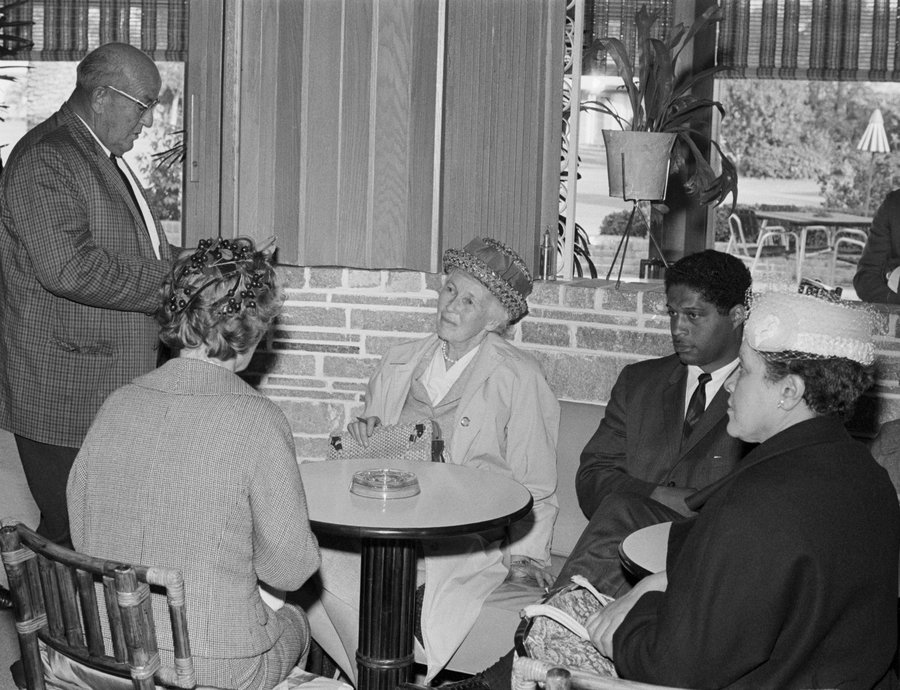
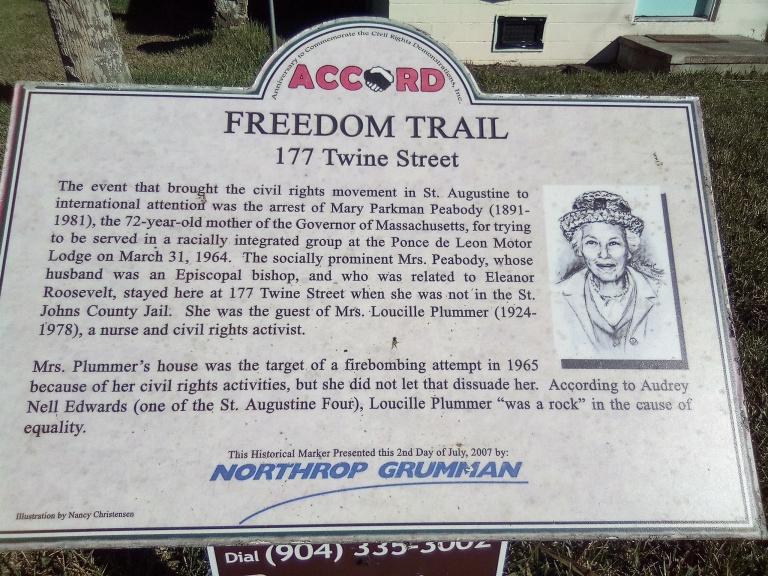
<a The event that brought the civil rights movement in St. Augustine to international attention was the arrest of Mary Parkman Peabody (1891-1981), the 72-year old mother of the Governor of Massachusetts (Endicott (Chub) Peabody) , for trying to be served in a racially integrated group at the Ponce de Leon Motor Lodge on March 31, 1964.
The socially prominent Mrs. Peabody, whose husband was an Episcopal bishop, and who was related to Eleanor Roosevelt, stayed here at 177 Twine Street when she was not in the St. Johns County Jail. She was the guest of Mrs. Loucille Plummer (1924-1978) a nurse and civil rights activist.
Mrs. Plummer’s house was the target of a firebombing attempt in 1965 because of her civil rights activities, but she did not let that dissuade her. According to Audrey Nell Edwards (one of the St. Augustine Four), Loucille Plummer “was a rock” in the cause of equal rights.
http://www.gettyimages.com/detail/1280-24/AP-Archive?esource=feed_google_video
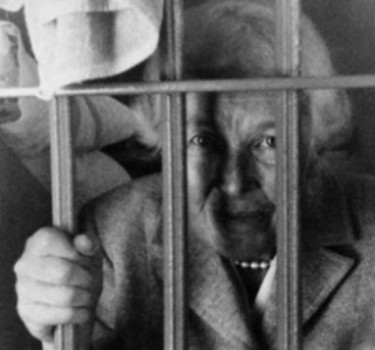
Mary Parkman Peabody(1891-1981) the mother of Endicott Peabody the Governor of Massachusetts along with Hester Campbell, Florence Rowe and Esther Burgess, the wife of the first Black Episcopal Bishop in the United States traveled to St. Augustine Florida to desegregate restaurants and hotels in the area. Working with the Southern Christian Leadership Conference the group of ladies descended on the local restaurants and when refused service they participated in a sit-in refusing to leave. Mary Peabody at the age of 72-years-of-age along with the 92 others was arrested. Mrs. Peabody spent 2 nights in jail to help desegregate the American south.
http://www.examiner.com/list/courageous-activists-for-african-american-freedom-and-equality
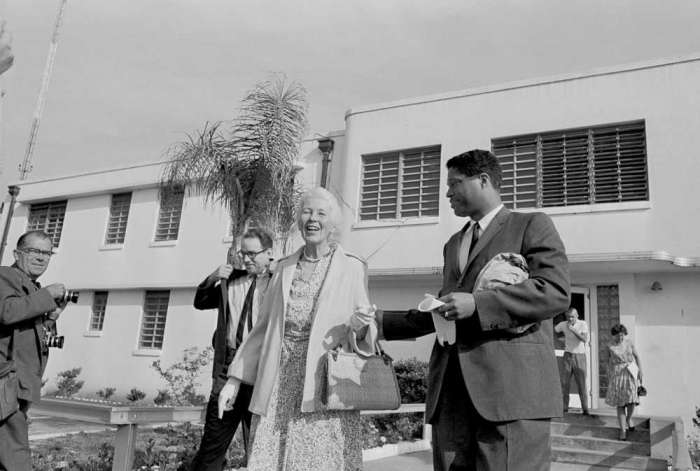
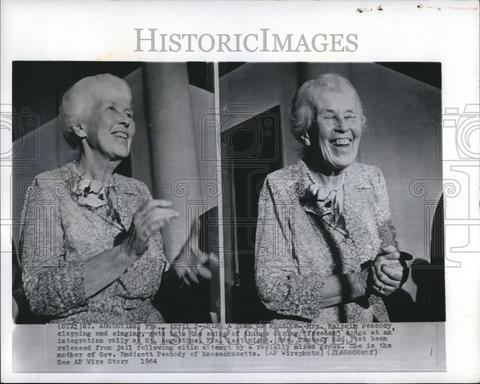
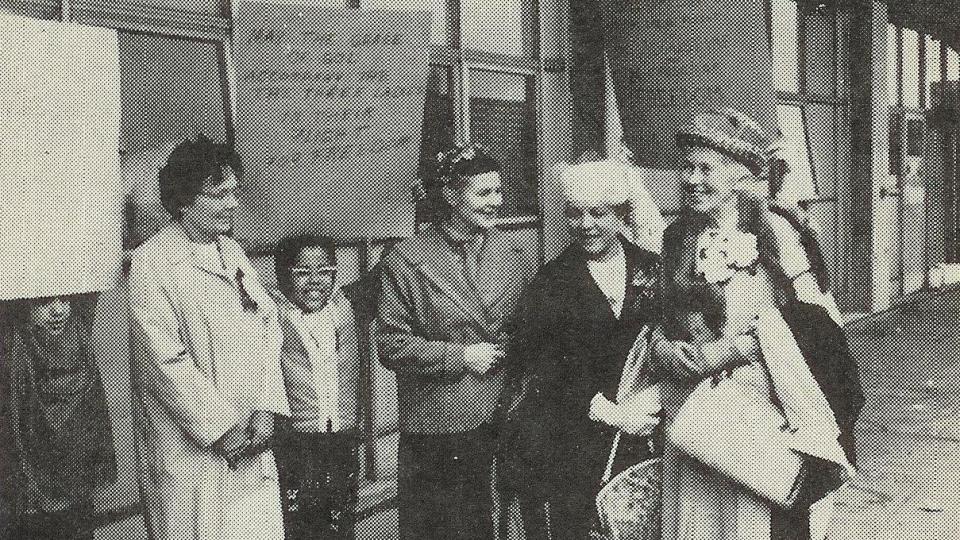
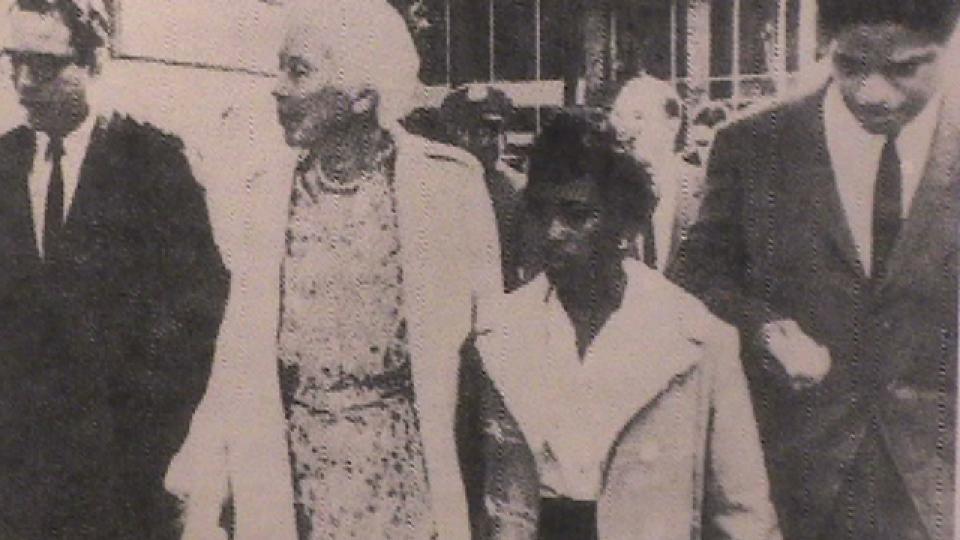
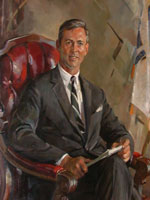
Governor Endicott Chub Peabody of Mass 1962-64 , Mary Parkman Peabody’s son
BIOGRAPHY
Mary Parkman Peabody, the eldest of five children of Henry Parkman and Mary Frances (Parker) Parkman, was born on July 24, 1891, in Beverly, Massachusetts. She attended the Winsor School in Boston, Massachusetts, and Miss Porter’s School in Farmington, Connecticut. In 1912, after inheriting money from an uncle, she embarked on a trip around the world with two friends and a chaperone, traveling to India, Burma, Ceylon, China, Japan, and the Philippines. After returning, she took classes at Simmons College School of Social Work and in 1916, she married Malcolm Peabody, son of Fannie and Endicott Peabody, the founder of Groton School. They had five children: Mary, known as Marietta (1917-1991), Endicott (1920-1997), George (born 1922), Samuel (born 1925), and Malcolm, Jr. (born 1928).
The couple settled in Lawrence, Massachusetts, where Malcolm Peabody was first curate and then rector of Grace Episcopal Church. Shortly after the birth of their first child, Malcolm Peabody began service as a World War I chaplain in France. During his absence, Mary Peabody worked with the Women’s Liberty Loan committee, which encouraged women to buy Liberty Bonds to support the troops, and was active in community welfare projects. Malcolm Peabody returned to Lawrence in 1919, and in 1925 the Peabodys moved to Chestnut Hill, Pennsylvania, where he served as rector of St. Paul’s Church; in 1938 he was elected bishop coadjutor of central New York and became bishop the following year. The Peabodys relocated first to Utica and then to Syracuse, New York. Mary Peabody taught religious classes for public school students in Syracuse and took in German and Austrian refugees during World War II. In 1960, Malcolm Peabody retired and the Peabodys moved again, to Cambridge, Massachusetts.
In 1964, at the age of 72, Mary Peabody was recruited by a member of the Southern Christian Leadership Conference to join a civil rights demonstration in St. Augustine, Florida. She traveled with Hester Campbell, wife of the dean of the Episcopal Theological Seminary in Cambridge, Florence Rowe (mother-in-law of her son Malcolm), and Esther Burgess, wife of the first black Episcopal bishop in the United States. At the request of the demonstation’s leader, Dr. Robert Hayling, Peabody and her companions attempted to get service at local restaurants and hotels. They were refused and Peabody was arrested for participating in a sit-in at a segregated motel dining room; she spent two nights in jail, drawing praise from Martin Luther King, Jr. Her son Endicott was governor of Massachusetts at the time, and partly because of this, her arrest drew a great deal of press coverage and she received large amounts of mail both praising and condemning her actions.
Following her return to Cambridge, Peabody remained active in the civil rights struggle and made many public appearances. She also worked for the rights of American Indians and the establishment of a school in Roxbury, Massachusetts. Malcolm Peabody died in 1974 and Mary Peabody died of heart failure on February 6, 1981.
http://oasis.lib.harvard.edu/oasis/deliver/~sch01116/a>

Mrs. Mary Parkman Peabody 2013 Recipient of the ‘Dr. Robert B. Hayling Award of Valor’
In honor and recognition of her courageous acts displayed during the 1964 Civil Rights Movement, ACCORD presents the “Dr. Robert B. Hayling Award of Valor” Posthumasely to the Late Mrs. Mary Parkman Peabody.
In a June, 2013 letter written by her son Malcolm E. Peabody, to Ms. Dalonja Duncan, President of ACCORD, Inc., he states, “I will be unable to attend the event, but…honored to receive the award in absentia…if mother were alive today, she would be very proud to receive the…award…she would insist that the courage of all those who participated in the demonstrations, particularly the children and Dr. Hayling…far exceeded what she was required to display…In representing my family let me say how touched we are to have this honor placed on our mother”
The Annual “Dr. Robert B. Hayling Award of Valor” was initiated and sponsored, July 2, 2009 by former Florida State Senator Dr. Anthony ‘Tony’ Hill. Past Recipients are Mr. James Jackson, Mr. Clyde Jenkins, Rev. Goldie Eubanks+, and Mrs. Loucille Plummer+ who had as a guest in her home, Mrs. Peabody in 1964.
It was 49 years ago: March 31, 1964: a time of excitement in the Nation’s Oldest City. It was spring break, and many college students had come to town — not to go to the beach, but to take part in civil rights demonstrations. The Elk’s Rest on Washington Street was the headquarters. The historic two-story building had meeting facilities, and also a kitchen where food could be prepared (civil rights veterans can still remember the peanut butter sandwiches). Integrated groups would be organized and sent out to the restaurants, lunch counters, motels and churches to see if they would be served, barred or arrested.
Not all of the visitors were students. One was Mary Parkman Peabody, 72-year-old wife of an Episcopal bishop, cousin of Eleanor Roosevelt, and mother of the governor of Massachusetts. Her presence in St. Augustine was very big news. FBI reports show that J. Edgar Hoover himself began taking an interest in the Nation’s Oldest City when he learned the governor’s mother would be coming here.
Mrs. Peabody agreed to “test” (in the parlance of the day) the Ponce de Leon Motor Lodge on U.S. 1 north of town. Two of her white friends, a Harvard professor and the wife of the president of the Episcopal Theological Seminary, agreed to go with her. They looked around for black people to accompany them — and came upon the women working in the kitchen of the Elk’s Rest: Georgie Mae Reed, Rosa Phelps, Cuter Eubanks, Nellie Mitchell and Lillian Twine Roberson. They were driven home to dress appropriately for the occasion, then went out to the Ponce Lodge — and were arrested. The next day it was front-page news all over the country. From that time until the signing of the landmark Civil Rights Act on July 2, 1964, St. Augustine got more media coverage that it had in the previous 399 years of its existence.
The sacrifices they made led Martin Luther King to hail them among the Heroes of St. Augustine”. Of these five black women, only Lillian Twine Roberson is alive today. A sister of the late city Commissioner and ViceMayor, HenryTwine. Lillian now lives in Jacksonville, FL. Her home on Gault Street in North City was burned down in 1964 (only the brick steps remain) after she sent her children to integrate the previously allwhile Fullerwood School and her husband was fired from his job at a local car dealership because of his civil rights activities.
One of the provisions of the Civil Rights Act of 1964 that grew out of the demonstrations in St. Augustine outlawed job discrimination — not just against blacks, but also against women. Every woman who now has a job that in previous generations reserved for men only, owes a vote of thanks to Mrs. Mary Parkman Peabody and the other “Heroes of St. Augustine”.
David Nolan, Historian & Author Anniversary to Commemorate the Civil Rights Demonstrations, Inc. http://www.accordfreedomtrail.org
Click to access Mrs.%20Peabody%20Story.pdf
****
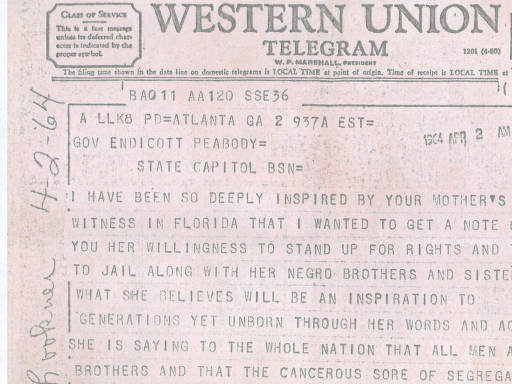
The Rev. Martin Luther King Jr. sent a telegram to Mary Peabody’s son, Massachusetts Gov. Endicott Peabody. King thanked the governor for the sacrifices of his mother, Mary, and for her willingness to be jailed for the St. Augustine sit-in.
Courtesy of the Civil Rights Library of St. Augustine
Why A Proper Lady Found Herself Behind Bars

Sheriff L.O. Davis reads a set of local laws to Mrs. Malcolm Peabody, Dr. Robert Hayling and Mrs. John M. Burgess. The protesters remained seated as they attempted to integrate the dining room at a table in the Ponce De Leon Motor Lodge.
Corbis

Mary Peabody leaves the dining room of a motel in St. Augustine, Fla., on March 31, 1964, after being arrested.
Harold Valentine/AP
This story is part of NPR’s 50th anniversary coverage of 1964. The year remains prominent in civil rights history for a number of reasons: the Freedom Summer, the murders of three civil rights workers, the passage of the Civil Rights Act and the challenge to Mississippi’s segregated delegation at that year’s Democratic National Convention.
Fifty years ago, St. Augustine, Fla., was a quiet, palm-fringed resort town with pastel Spanish colonial buildings. There was warm weather, and the white sand beaches off the Atlantic coast lured thousands of tourists every year. There was also a historic part of downtown that had a building often referred to as “The Old Slave Market,” with good reason: For several decades, that had been the building’s purpose.
Racial tension in St. Augustine had been bubbling. The town lacked public amenities for blacks — much of the area was segregated. And for years, there had been a growing civil rights movement that had been met with increasingly violent resistance from local whites.
Despite that, it was clear black pushback was growing. As Congress debated passing a civil rights act, black leaders wanted to increase the pressure on elected representatives by highlighting racial injustice and violence in various parts of the country.

The Rev. Martin Luther King Jr. sent a telegram to Mary Peabody’s son, Massachusetts Gov. Endicott Peabody. King thanked the governor for the sacrifices of his mother, Mary, and for her willingness to be jailed for the St. Augustine sit-in.
Courtesy of the Civil Rights Library of St. Augustine
The Rev. Martin Luther King Jr. and his Southern Christian Leadership Conference put out a call for white students in the North to skip the beach on their spring break and come to Florida to protest segregation. Inviting young white people to push for civil rights would bring attention to places where the national media had ignored dramatic racial injustices.
To further increase the pressure, King’s deputy, Hosea Williams, visited Boston to see if any elderly Bostonians would volunteer. Williams believed the image of grandmothers being ushered off to jail would be a sure bet in gaining national publicity for places that had been in the shadows. One of Williams’ volunteers turned out to be 72-year-old Mary Parkman Peabody, wife of the former bishop of the Episcopal Diocese of Central New York and mother of Endicott Peabody, then-governor of Massachusetts.
Historian David Colburn, professor emeritus at the University of Florida, said the SCLC knew St. Augustine was preparing to celebrate its 400th birthday, and decided to hijack the tourist message with a civil rights message.
“It was clear that they were trying to mobilize a civil rights army to come to St. Augustine to lead demonstrations against the segregation policies of the community,” Colburn says.
The late governor’s brother, Samuel Peabody, says his mother had been involved in what she called “justice issues” for several years.
“She never had a doubt about her opinions, and she stood up,” says Peabody, a retired New York businessman. “She was articulate about them at all times.”

Mary Peabody poses in the St. Johns County Jail on a return visit to St. Augustine, Fla.
Courtesy of the Civil Rights Library of St. Augustine
The last week of March 1964, Mary Peabody and a few other powerful women flew down to St. Augustine. With members of the SCLC, they tried to attend services at Trinity Episcopal Church. The rector locked the doors.
They attempted to go to several local restaurants, and were turned away. Then the group decided to try for lunch at the Ponce de Leon Motor Lodge —which just happened to have a group of reporters staying there.
Mary Peabody, says Colburn, was clear about the probable consequences: “She even ran into an old friend on the street in St. Augustine as they were going to the hotel restaurant, and was asked what she was doing there and said, ‘Well, I’m about to get arrested!’ “
Which was true. She spent two nights in the local jail before her youngest son, Malcolm, was allowed to bail her out. Samuel Peabody says he got word a week later, when he returned from a trip abroad:
“I was not told about it at all. What surprised me was I saw my mother on the front page of every newspaper in the country!” he recalls. “Or at least every newspaper where I was at the time.” (Southern newspapers were the exception, for obvious reasons.) The picture of Mary Peabody, with a proper handbag and pearls, her white hair topped by an ever-present hat, made national news.
It was a turning point.
Black St. Augustine residents had been working to break segregation for years before Mary Peabody’s arrival, but her presence in March 1964 made their struggles visible. Malcolm Peabody says his mother knew her job wasn’t the same as black local protesters, and was aware she played a very specific role:
“She did not face the danger that so many of them did, but the fact that she was able to generate the publicity made her special.”
That publicity was a catalyst for other demonstrations soon after, some of them quite violent. The St. Augustine Movement would become known as one of the most critical — and until recently, one of the least-known — campaigns in the civil rights history.

Commodore Daniel M Parkman Sr & Elizabeth at 177 Twine, St Augustine FL on The Freedom Trail Nov 2022 (next photo) :House of Parkman & St. Augustine, America’s Oldest Ancient CityHouse of Parkman & Ancient City of St. Augustine:House of Parkman & St. Augustine, America’s Oldest Ancient CityMary Parkman Peabody 1964 audio interview link about St Augustine arrest (start at 6 minutes to 20 minutes) : https://americanarchive.org/catalog/cpb-aacip_15-87brvgz0 She was arrested at the Ponce de Leon Motor Lodge Inn that was torn down circa 2003 and is now the Hilton Inn 32 Avenida Menendez, St Augustine FL. The pool is original and a plaque marks the spot that Martin Luther King & she conducting their Civil Rights actions.











See Beachwalk on Vilano picture three pictures above:
https://www.beachwalkonvilano.com/info.php?pnum=2
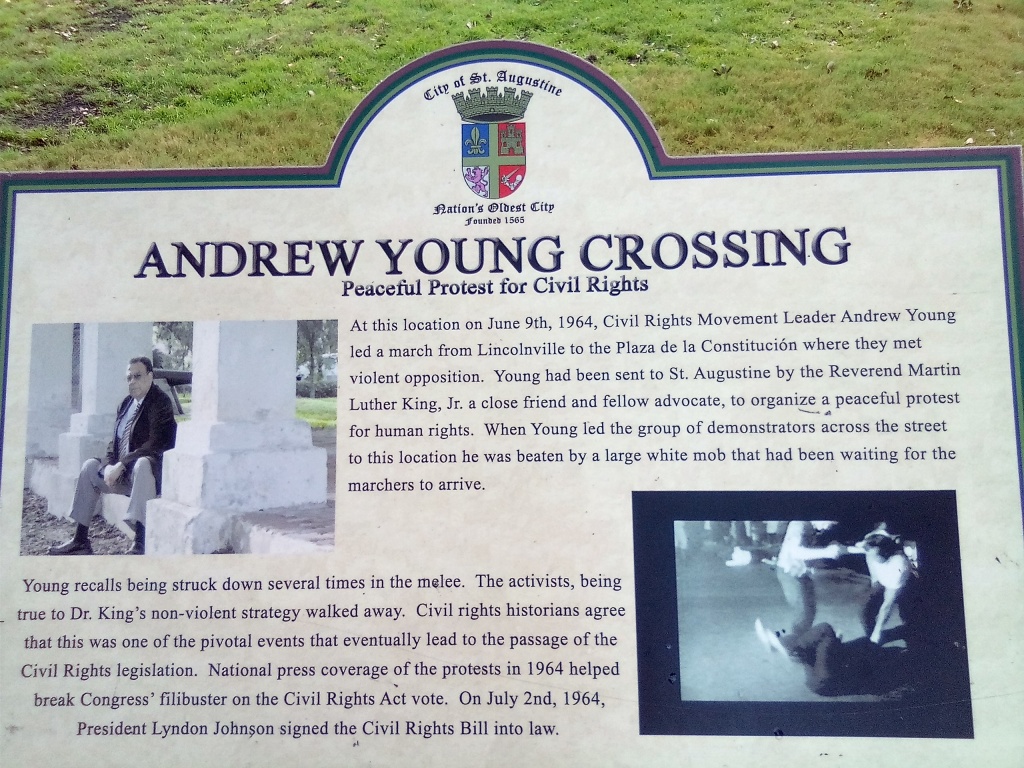


March 14, 2010 at 10:47 pm |
Of course she would be jailed with Martin L. King! She believed the same things he did!! Not to mention making speeches to and helping Afro-Americans!!!
September 3, 2011 at 1:36 pm |
when an eagle soars it does not see race, religion, creed or lines in the sand….I try to be a better eagle every day…..
December 28, 2011 at 11:46 pm |
impressive family history . ill have to tell you mine 1 day
April 16, 2012 at 1:22 pm |
The seeds one plants in life bears fruit. So plant good seeds and bear good fruit.
May 20, 2012 at 6:34 pm |
I met Ms. Peabody In 1959 as an AFS scholarship student in Syracuse. It was one of the most resonating experiences of my youth. what I regret to this day is how young and immature I was to grasp the importance of her words and her commitment to racial justice in the world.
Pietro Garau, Rome, Italy
May 20, 2012 at 8:29 pm |
I spoke to her husband Gov Chub Peabody and son Cotty who managed 3 million acres of timber lands for John Hancock Insurance in Boston. Did mention the story to Ambassador Andy Young who confirmed it. Enjoy the rest of this blog: http://www.ParkmanGenealogy.wordpress.com also: http://www.youtube.com/dmparkman and http://www.2012Patriot.wordpress.com and http://www.TeaPartyWPBFL.wordpress.com
October 31, 2013 at 12:33 am |
Pietrogarau
Hope to hear from you soon.
Daniel M. Parkman, Sr.
http://www.UeberGlobal.com
November 5, 2013 at 9:31 am |
Pietro
Am seeking UN help
June 13, 2016 at 1:32 pm |
[…] https://parkmangenealogy.wordpress.com/2010/01/01/mary-parkman-peabody-civil-rights/ […]
November 6, 2019 at 9:46 am |
Hand crafted accessories
Mary Parkman Peabody – Civil Rights – 1964 | Parkman Genealogy